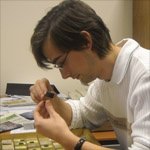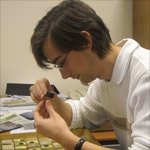Eucratidia was a Greek town in Bactria, one of the easternmost area ever controlled by the Greeks, located at the modern site of Aï Khanum in North-Eastern Afghanistan. The history of this city is still rather unknown, but it seems that, it was first built by Alexander the Great or one of his early Seleucid successors in the last decades of the 4th century BC, under its the name Oskobara.
The town was excavated by French archeologists between 1964 and 1978.Many beautiful items were found, and what came out is a mixture of Greek and Iranian elements. For example, even if the town's plan is Greek, it is not strictly hippodamian. The nature of the temples seem to indicate local cults, maybe syncretic ones. A herôon was also found, dedicated to the founder of the city, Kineas. And on it were inscribed the Delphic maxims, showing the will of keeping Greekhood alive, even in this far-eastern area.
After the Seleucid period, the town passed under Greco-Bactrian control, during which it seems to have well developped. It was then called Eucratidia, the name taken from Eucratides I, a famous and powerfull Greco-Bactrian king whose reign is dated from 170/166 BC to 145/138 BC. This change of name may indicate than the city had a key role during his reign; especially knowing that Eucratides was first an usurper; maybe Eucratidia was the center of his uprising. Unluckily, the town fell shortly after in two phases: it was first taken by some Saka nomads from north somwhere around the end of the140s BC, and then it was looted to the ground by the Yuezhi that were pushing away the Sakas.

